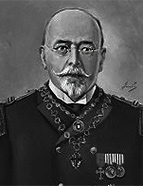

In his extensive and varied oeuvre, four areas stand out: maritime history, law — especially international law — the history of geography and geography itself, and colonial studies.
Among his most representative works are: Luís de Camões Marinheiro [Luís de Camões the Sailor] (1880); Lições de História Marítima Geral [Lessons in General Maritime History] (1895); O Infante D. Henrique e a Arte de Navegar [Prince Henry the Navigator and the Art of Sailing] (1896); Noções elementares de Geografia, Chronologia e Chorographia de Portugal [Elementary Notions of Geography, Chronology, and Chorography of Portugal] (1896).
In a lecture he delivered at the Liga Naval Portuguesa [Portuguese Naval League], entitled Política marítima de Portugal na Historia; suas origens e consequências [Portugal's Maritime Policy in History: Its Origins and Consequences,] published in 1907 in the League's bulletin, the main lines of Almeida d'Eça's historiographical thinking regarding the history of Portugal, particularly its maritime aspect, can be discerned. He emphasised the study of three characteristics in a maritime people: race, geography, and economic conditions. The Portuguese population emerged from a mixture of races and peoples, dating back to the formation of Portuguese territory. The common denominator of this anthropological heterogeneity was the "essentially maritime" factors; however, agriculture, constrained by forests and moorland, was also significant for the self-sufficiency of the communities that populated the Portuguese landscape and for the export of products such as wine and olive oil.
Indebted to the liberal historiographical narrative, Almeida d'Eça adopted the proposals of the historian Rebelo da Silva, beginning with his Memória sobre a População e a Agricultura de Portugal desde a Fundação da Monarquia até 1865 [Memoir on the Population and Agriculture of Portugal from the Foundation of the Monarchy to 1865], a work that emphasised the importance of demographic and economic factors in the study of Portuguese history. This work provided insights into the legislation and measures that had developed agriculture and commerce over the centuries. For Almeida d'Eça, who sought evidence to support Portugal’s significant investment in the sea and maritime activities, one of Rebelo da Silva's most important lessons was that the Portuguese nation "made itself." Conversely, authors such as the Viscount of Santarém and Oliveira Martins influenced Almeida d'Eça's methodology in writing História Marítima de Portugal [Maritime History of Portugal], viewing it as a political entity that, throughout its history, had consolidated itself at sea, through the institutions it established and the legislation enacted by its rulers, asserting itself in foreign relations through diplomacy and alliances with other nations. Portugal's maritime power, materialised in its fishing, trading, and war navies, emerged from internal political and economic reinforcement, which was crucial for overseas expansion. In this vision of Portuguese history, Portuguese society was inextricably linked to the use of the sea from the outset.
